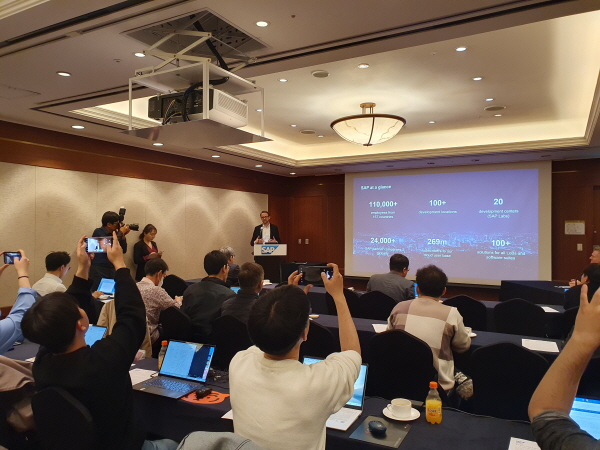SAP가 클라우드화된 ERP를 통해 세계가 더 지속 가능성 기업이 지능형 엔터프라이즈로 진행할 수 있을 뿐만 아니라 SAP의 네트워크에 참여함으로써 지속가능성을 달성할 수 있다고 밝혔다.
비즈니스 프로세스 자동화·기업 직면 도전과제 해결
AI 이용 이상 행위 시 자동화 프로세스 최적화 지원
SAP가 클라우드화된 ERP를 통해 세계가 더 지속 가능성 기업이 지능형 엔터프라이즈로 진행할 수 있을 뿐만 아니라 SAP의 네트워크에 참여함으로써 지속가능성을 달성할 수 있다고 밝혔다.
SAP 코리아는 30일 인터컨티넨탈 서울 파르나스에서 기자간담회를 개최하고 디지털 공급망 혁신 및 지속가능성에 대한 심도 있는 인사이트를 공유했다.
이번 행사에는 토마스 자우에레시그(Thomas Saueressig) SAP 제품 엔지니어링 총괄 및 이사회 임원과 폴 메리엇(Paul Marriot) SAP 아태지역 회장이 참석했다.
먼저 발표한 토마스 자우에레시그 총괄은 기업이 급변하는 시장과 환경에서 생존할 수 있도록 지원하는 SAP의 노력에 대해 강조했다.
자우에레시그 총괄은 SAP는 기업이 비즈니스 프로세스를 자동화하고, 공급망 회복탄력성을 강화하며, 지속가능한 기업으로 변모하는 등 기업이 마주한 가장 큰 도전과제를 해결할 수 있도록 지원한다고 밝혔다.
이러한 노력의 일환으로 SAP는 최근 출시한 그로우 위드 SAP(GROW with SAP) 및 SAP 데이터스피어(SAP DataSphere)를 바탕으로 중소기업 등 다양한 규모와 산업의 기업들이 마주한 도전과제 해결을 지원한다.
또한 SAP는 기업이 마주하고 있는 도전과제들을 수월하게 극복하기 위해 세계적인 규모의 혁신을 강조하며 SAP 랩스 코리아(SAP Labs Korea)가 포함돼 있는 글로벌 SAP 랩스 네트워크(SAP Labs Network)를 소개했다.
자우에레시그 총괄은 SAP가 세계가 더 지속 가능성 기업이 지능형 엔터프라이즈로 진행할 수 있을 뿐만 아니라 이제 SAP의 네트워크에 참여함으로써 지속 가능성을 진행할 수 있도록 돕고 있다며 SAP의 미드 마켓이 이런 비스니스 혁신을 이끌고 있고, 계속해서 SAP 내에 지속적인 혁신을 가능하게 하고 있다고 밝혔다.
또한 한국이 글로벌 혁신의 중심에 있다며 하나 클라우드 자체가 한국에서 개발됐고, SAP에 굉장히 중요한 부분을 차지하고 있다고 언급했다.
이어 발표한 폴 메리엇 회장은 SAP 랩스는 SAP의 혁신의 근간이라고 강조하며, 전 세계에서 빠르게 성장하는 지역 중 하나인 아태지역 중요성에 대해 강조했다.
특히 한국 시장의 경우 디지털 뉴딜 2.0 추진계획 및 대한민국 디지털 전략 등 정부 주도의 디지털 전환을 위한 노력이 진행되고 있는 중요한 시장이라며 전략적 중요성을 부각했다.
폴 메리엇 회장은 아태지역이 전 세계 탄소 배출량의 절반인 170억 톤의 탄소를 배출한다며 기후 변화에 맞서 싸울 수 있는 진전을 이루는 것이 SAP 전략의 토대라고 강조했다.
AI에 대한 이야기도 있었다.
폴 메리엇 회장은 SAP의 클라우드에 AI를 적용했다며, 프로세스에서 이상 행위나 이상한 점을 감지하면 그에 따라 적합한 자동화 프로세스가 진행되고 그 프로세스 내에서 사용자가 바로 시스템 내에서 추천하는 액션 아이템이나 지원을 바로 결정하기 위한 최적화된 지원이 이뤄진다고 밝혔다.
또한 향후 챗GPT기술을 활용하고 5월 서펙 사파이어 행사에서 발표할 예정이라고 언급했다.
한편 SAP는 지난 2009년부터 지속가능성 목표를 수립 및 달성을 위한 노력을 지속해오며 2012년부터 통합 보고서에 지속가능성 관련성과를 공개해왔다. 2014년부터는 SAP의 데이터 센터와 전체 사무실 사용 전력의 100%를 재생 가능한 에너지로 운영하는 그린 클라우드(Green Cloud)를 실행하고 있다.
또한 SAP는 2023년 탄소 중립을 달성하고, 2030년까지 가치사슬 전반에 걸쳐 탄소배출 제로를 달성할 예정이다.
SAP는 기업이 조직 내외 뿐 아니라 전체 가치사슬에서 지속가능한 운영을 달성할 수 있도록 지원하는 솔루션을 제공하고 있다. SAP는 기업의 스코프1에서 스코프3까지 전체 공급망에서 발생하는 실질적인 탄소배출량을 측정할 수 있도록 SAP 제품 발자국 관리(SAP Product Footprint Management), 순환 경제로의 전환을 위한 SAP 책임감 있는 디자인 및 제작(SAP Responsible Design and Production), 보다 지속가능한 비즈니스 모델을 더욱 많이 도입할 수 있도록 지원하는 SAP 지속가능성 컨트롤타워(SAP Sustainability Control Tower) 등 다양한 솔루션을 제공한다.
